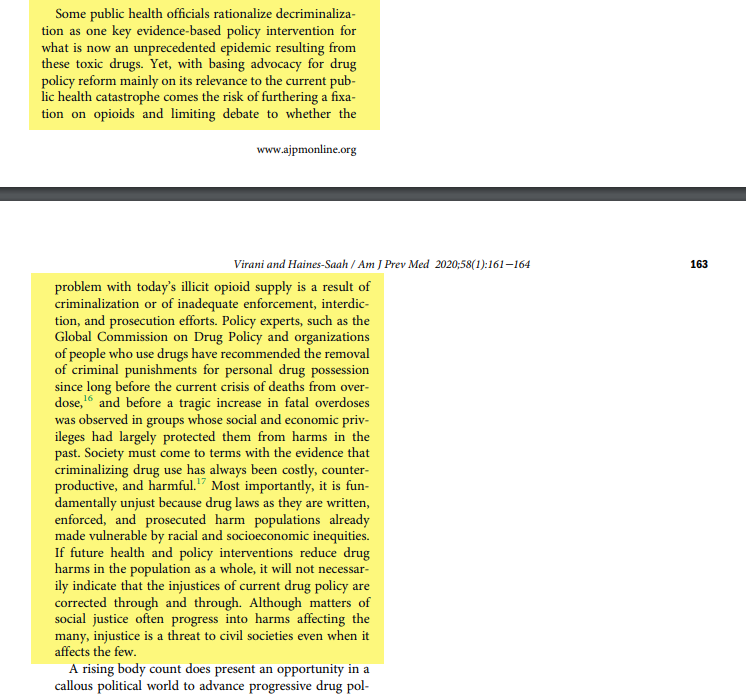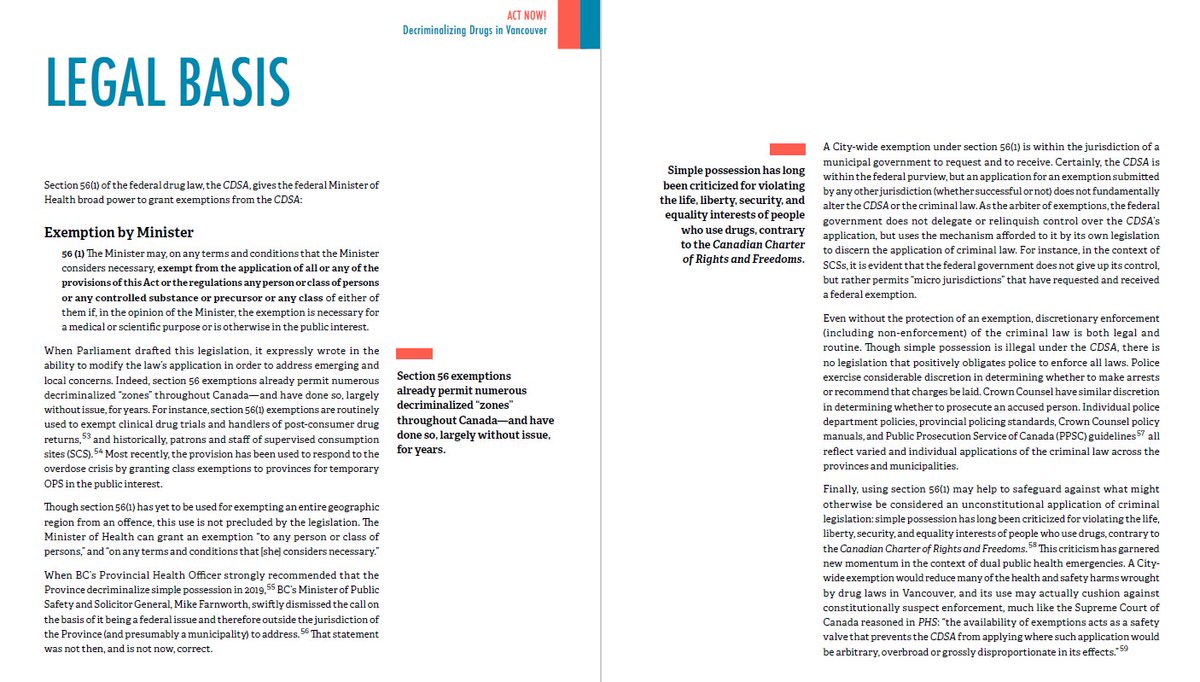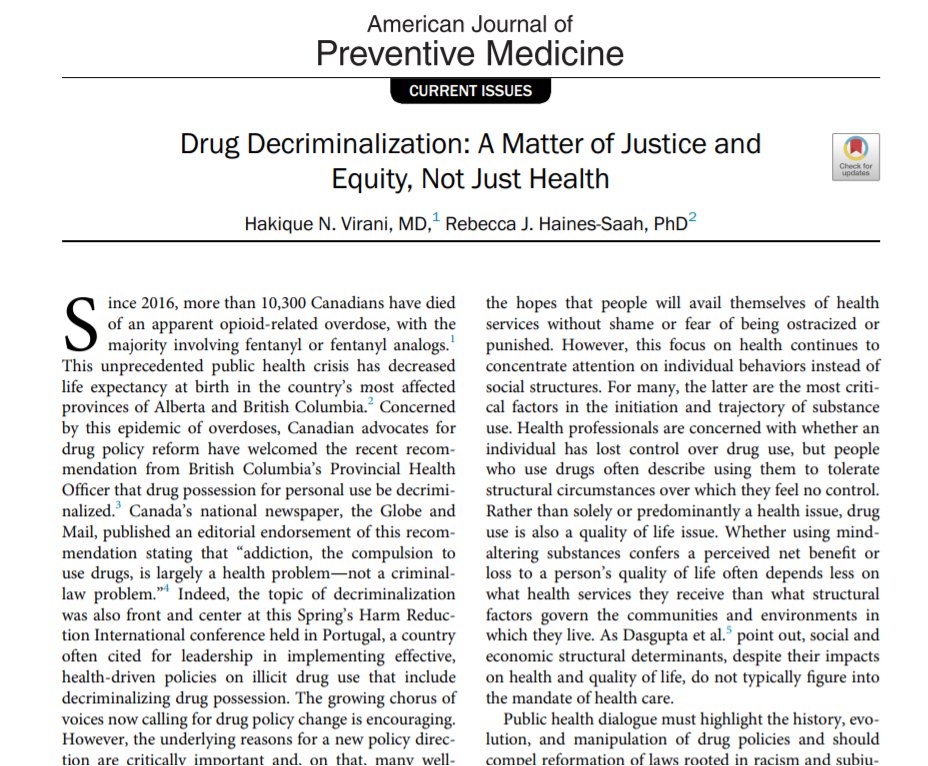
Had a starter conversation with @Cath_Cullen, @piya, and former Premier @BrianGallantNB on @PnPCBC this week about Mayor @kennedystewart's motion to seek a federal exemption to decriminalize drugs in Vancouver.
Some narratives worth addressing
(Thread)
Some narratives worth addressing
(Thread)
1. The collision of COVID+OD epidemics makes drug law reform more urgent, yes, but criminalizing people who use certain drugs is no more or less unjust now compared to before. It has always been racist, classist and wrong.
As Dr. @RebeccaSaah and I wrote in @AmJPrevMed
As Dr. @RebeccaSaah and I wrote in @AmJPrevMed

You can read that paper here: rsaah.ucalgaryblogs.ca/files/2020/06/…
and follow a thread about it here:
and follow a thread about it here:
https://twitter.com/hakique/status/1207713414040051712?s=20
That paper deals a lot with another narrative worth addressing:
2. Drugs are a health issue, so take it out of the hands of the law enforcement/justice sectors.
Not really.
Most people who use drugs don't have health problems (including addiction) from using, and...
2. Drugs are a health issue, so take it out of the hands of the law enforcement/justice sectors.
Not really.
Most people who use drugs don't have health problems (including addiction) from using, and...
...the experience of health care for many people who use drugs can be as traumatic as the experience with the justice sector.
It's probably more accurate to say drug use is a quality of life issue. Some people experience an intolerable quality of life without drugs.
It's probably more accurate to say drug use is a quality of life issue. Some people experience an intolerable quality of life without drugs.
Measures like criminalizing drug possession that stigmatize, exclude and punish people make quality of life worse and often increase the need for psychoactive drugs.
Measures that subject people to involuntary "help" for may well do the same. Bringing us to the next narrative...
Measures that subject people to involuntary "help" for may well do the same. Bringing us to the next narrative...
3. People who use drugs should go to treatment instead of jail.
Sounds good, but no.
Aside from involuntary treatment being generally ineffective (or harmful), this kind of *partial* decriminalization doesn't resolve some of the biggest harms from drug laws.
Sounds good, but no.
Aside from involuntary treatment being generally ineffective (or harmful), this kind of *partial* decriminalization doesn't resolve some of the biggest harms from drug laws.
Police could still stop, search, traumatize and confiscate drugs from people who have them, and you can guess the groups who will experience this are the ones already most harmed by drug laws.
To avoid those encounters with police, people will continue using in risky ways, alone
To avoid those encounters with police, people will continue using in risky ways, alone
Besides, most people who use drugs don't have addiction, so "treatment" isn't "necessary".
In partial decrim you could fine "recreational" (ugh) users to deter drug use. But it wouldn't be investment bankers playing poker and doing blow on the weekends who would face these fines
In partial decrim you could fine "recreational" (ugh) users to deter drug use. But it wouldn't be investment bankers playing poker and doing blow on the weekends who would face these fines
It would be, again, the same groups who are already most harmed by drug laws. Partial decrim could even exacerbate the very inequities that play a role in psychoactive substance use in many people.
(See our AJPM paper for how this played out with cannabis law reform in DC.)
(See our AJPM paper for how this played out with cannabis law reform in DC.)
What's needed is *full* decriminalization. No administrative penalties. No non-consensual "treatment". No stopping, searching, harassing, confiscating.
@Caitlin_Ona of @pivotlegal unpacks the arguments for full decrim here. Read it and follow her, please.
d3n8a8pro7vhmx.cloudfront.net/pivotlegal/pag…
@Caitlin_Ona of @pivotlegal unpacks the arguments for full decrim here. Read it and follow her, please.
d3n8a8pro7vhmx.cloudfront.net/pivotlegal/pag…
4. Is it bizarre for a *city* to decriminalize drugs? Drug law is federal jurisdiction.
No, it's bizarre that the feds still refuse to do this for the country.
Look to @Caitlin_Ona again for the strong legal basis for a Section 56 exemption for Vancouver as a geographic class.
No, it's bizarre that the feds still refuse to do this for the country.
Look to @Caitlin_Ona again for the strong legal basis for a Section 56 exemption for Vancouver as a geographic class.

Mayor Stewart has to step up in this way because the feds haven't. That's another narrative worth addressing.
5. When the levels of government responsible to protect public health and safety from a hazard fail to do so, good local leaders do.
(That might be relevant to C😷VID.)
5. When the levels of government responsible to protect public health and safety from a hazard fail to do so, good local leaders do.
(That might be relevant to C😷VID.)
There are many more considerations and narratives on this topic but here's the one I think is most important.
6. For this policy move to work (after the feds sign off, which they'd better), the communities of people most affected by drug laws must be involved at every step.
6. For this policy move to work (after the feds sign off, which they'd better), the communities of people most affected by drug laws must be involved at every step.
We talked on @PnPCBC about Portugal as a good example decriminalization. #YVR can follow that decent example, or it can lead globally by addressing even more of the major harms of current drug laws. The way to do that is to lean on the people who know.
https://twitter.com/garthmullins/status/1328817247477895169?s=20
(This could easily have been narrative #1, but thought I'd "Keep 6" for @garthmullins and @crackdownpod because their crew does for so many people and it's time for the rest of us to do it for them.)
(end)
(end)
• • •
Missing some Tweet in this thread? You can try to
force a refresh





